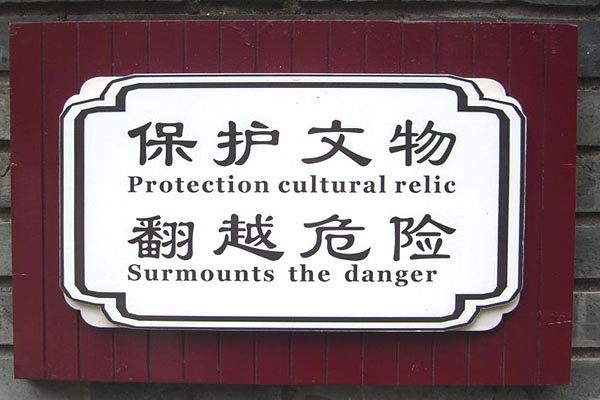 |
| Can you figure out what this sign means? (Wikipedia) |
Note: Remember, Amanda is a typical Chinese learner of English, but others can make these mistakes too! In any case, it's helpful to learn how to spot errors. Read Part I and Part II of this conversation.
Get Ready: What is a modal? What form of the verb should be used after a modal?
It's the third and last part of the conversation between Billy and Amanda, and the mistakes keep coming. How many can you find this time? So, what's your total for the three conversations?
--------Billy: Did you have any trouble while you were in New York?
Amanda: No. But in the hotel a man said I must to close my TV because the sound was too big.
Billy: And did you?
Amanda: No, I told him I would only watching a little longer.
Billy: Well, thank you for telling me about your trip.
Amanda: No thanks! Welcome to visit my hometown sometime!
Read more: https://en.wikipedia.org/wiki/Chinglish
Practice: Match the mistake to its correction.
- I must to
- close
- big
- watching
- No thanks.
- Welcome to visit...
- You are welcome to visit...
- loud
- I must; I should
- watch; be watching
- turn off
- You're welcome.
Answers are in the first comment below.
Here's the rest of the conversation, with correct English substituted for the mistakes.
Billy: Did you have any trouble while you were there?
Amanda: No. But in the hotel a man said I had to turn off my TV because it was too loud.
Billy: And did you?
Amanda: No, I told him I would only be watching a little longer.
Billy: Well, thank you for telling me about your trip.
Amanda: My pleasure! Please come visit my hometown sometime!
Explanation of the Answers: After you check your answers in the first comment below, read on for more information on Amanda's mistakes and their correct forms.
- 14-16. a man said I must to close my TV because the sound was too big: This sentence has three problems. First, we don't say "must to do." Just "must do." And by the way, Americans seldom use "must." We usually say, "have to" or the inelegant "have got to." Second, we don't "close" a TV, we turn off a TV (and light, computer, etc.) And third, we don't say "the sound was big." We say, "It was loud."
- 17. I would only watching a little longer: We use the base form (in this case, "watch") with modals such as would, will, can, might, etc. "I would only watch a little longer." With -ing, we need a "be" verb; in this case, "I would only be watching..." Either way is correct.
- 18. No thanks: This is a very common problem. "No thanks" is a refusal: "Would you like some tea?" "No, thanks." This means "I don't want tea." The most common response to "Thank you" is "You're welcome," or perhaps "My pleasure." But many people use less formal expressions like, "No problem" or "That's all right."
- 19. Welcome to visit my hometown: We only use "Welcome to" when someone arrives at a place, and then it's followed by a noun describing the place (sometimes with a modifier): "Welcome to Shenzhen," or "Welcome to our house." A better expression here would be, "Please visit my hometown" or "You are welcome to visit my hometown sometime." The "You are" makes the sentence acceptable.
Submitted to the Shenzhen Daily for November 27, 2007


Answers to the Practice: 14. c; 15. e; 16. b; 17. d; 18. f; 19. a
ReplyDelete